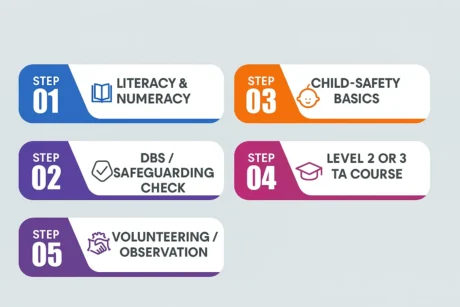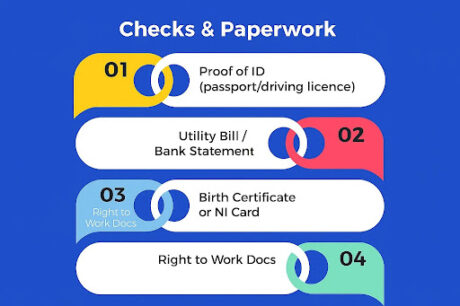So, you want to work in schools but have no experience yet. Don’t worry—you’re not alone. This blog tells you how to become a teaching assistant with no experience. There’s a clear, safe path into teaching support, and this guide will show you the steps.
The quick answer is simple. You’ll need basic literacy and numeracy, a background and safeguarding check. There’s no single national rule, and requirements can vary depending on the school or region. For example, schools in England may ask slightly different things than those in Scotland or Wales, but the core steps are similar.
You can start without any experience by arranging a school observation or volunteering, and completing a short safeguarding course. This gives you practical insight and makes your application more appealing. Plus, recognised TA courses are available online with tutor support, letting you study from home at your own pace.
In this guide, we’ll cover everything you need to know: the minimum requirements for first-timers, the different course levels, whether a placement is needed, and how online study works.
What Schools Ask for (First-Time TAs)

If you’re applying for your first TA role, schools usually look for a few essentials. You need good literacy and numeracy skills, a background and safeguarding check, and a clear understanding of child safety basics. These ensure you can support children safely and confidently.
Even without classroom experience, you can make your application stronger. Completing a Level 2 or Level 3 TA course shows schools you’re serious, reliable, and ready to help students learn. Some schools may also value volunteering or observation hours, which prove your commitment and give you practical insight into school life.
Requirements can vary depending on the school or region. For example, some primary schools may ask for a few hours of work experience or volunteering before hiring. Others focus more on your qualifications and safeguarding knowledge.
Must-Haves for New Teaching Assistants
Here’s a simple list of what schools usually ask for:
- Basic literacy and numeracy – even if your grades are old, you can take a short skills test or show recent learning.
- Background check / DBS – proves you’re safe to work with children.
- Child-safety knowledge – complete a short safeguarding course online or in person.
- Level 2 or Level 3 TA qualification – optional, but makes your application much stronger.
- Volunteering or observation – shows schools you’ve seen a classroom and understand the role.
Do the Checks and Paperwork (DBS, ID, References)

Before you can work as a teaching assistant, schools need to know you’re safe to be around children. In the UK, this means completing a DBS check (Disclosure and Barring Service).
The DBS check is usually requested by the school or training provider. You’ll need to provide proof of identity, such as:
- Passport or driving licence
- Utility bill or bank statement
- Birth certificate or national insurance card
The process can take 2–6 weeks, depending on the provider and your documents. Some schools may ask for an enhanced DBS, which includes checks for any previous safeguarding concerns.
Tip: Start your DBS check as early as possible. Waiting until the last minute can delay your application.
It’s also helpful to keep digital copies of your DBS, ID, and certificates. Many schools and online course providers ask for these, and having them ready shows you’re organised and serious.
Other important paperwork may include:
- Right to work documents if you’re not a UK citizen
- References from volunteering, previous jobs, or community work
- Any safeguarding or child protection certificates you’ve already completed
Getting all your paperwork sorted early gives you peace of mind. You’ll feel more confident applying for TA roles, and schools will see you as reliable and prepared.
Build the Right Skills for the Classroom
Being a teaching assistant isn’t just about qualifications. Schools value soft skills that show you can support children and staff. Here’s what matters and how beginners can show it:
- Calm – Stay composed when a child is upset. Example: help a child solve a problem without raising your voice.
- Clear talk – Explain tasks simply. Example: guide a student through a maths question step by step.
- Patience – Give students time to understand. Example: repeat instructions calmly until they get it.
- Teamwork – Work well with teachers and other staff. Example: share observations during a staff meeting politely.
- Basic IT – Use classroom technology confidently. Example: help a child log in to an online learning tool.
- Reliability – Be dependable and punctual. Example: arrive on time every day and stick to your schedule.
Plan Your Costs and Study Time
Becoming a teaching assistant costs some money, but planning helps. Here’s what you need to know:
- DBS/background check: about £44–£50. This proves you are safe to work with children.
- Level 2 TA course: £200–£350. Good for beginners, teaches basic classroom skills.
- Level 3 TA course: £400–£600. For those who want more responsibility.
- First aid course: £50–£100. Helps you know what to do in emergencies.
Courses take different times. Online courses can be done at your own speed. They usually take a few weeks. Classroom courses may take a few evenings or weekends.
Money-saving tips:
- Some schools pay for your course if you agree to work for them.
- Volunteering at a school can give you experience and sometimes cover small costs.
- Look for local colleges or community programs that offer cheaper courses.
Planning money and time carefully makes the process easier and less stressful. You will feel ready and confident to start your first TA job.
Teaching Assistant Salary
You’ve just read how to become a teaching assistant, but that’s only half the story. The next step is just as important — knowing what you can actually earn. Read our Teaching Assistant Salary Guide to see real earnings, career growth, and what affects your pay.
Your First Steps Without Experience
You don’t need prior experience to start. First, ask a school for an observation. Email politely and explain that you want to learn about the TA role.
Next, volunteer at schools, nurseries, or community centres. Even a few hours a week helps you gain experience and shows commitment. While observing or volunteering, collect a simple reference from a teacher or supervisor. Ask them to note your reliability and attitude.
Tip: Keep a log of dates, tasks, and outcomes. Later, you can quote this on your CV to show real skills.
Doing this early gives you confidence, experience, and proof for your first TA application.
Choose Your Course Level (L2, L3, HLTA)
Level 2 TA Course
- Who it suits: Beginners with no experience.
- Placement: Not required, but recommended if possible.
- What you learn: Supporting students, basic classroom routines, safeguarding, and simple lesson support.
- Time/workload: Usually 6–12 weeks online, a few hours per week.
- Employer view: Shows commitment and basic readiness for school work.
- Next step: Consider Level 3 for more responsibility.
Level 3 TA Course
- Who it suits: Those with some experience or a Level 2 qualification.
- Placement: Often included or recommended for practical experience.
- What you learn: Supporting SEN students, advanced classroom management, lesson planning, and teamwork.
- Time/workload: 3–6 months online or part-time, requires more study than Level 2.
- Employer view: Seen as skilled and reliable; can take more responsibility.
- Next step: HLTA qualification or specialist roles.
HLTA (Higher Level Teaching Assistant)
HLTA is for teaching assistants who want more responsibility and leadership in schools. You need to show you can work well in a real classroom. The course teaches how to lead lessons, help with assessments, plan work, and manage behaviour. It usually takes a few months and includes teaching practice. Employers like HLTA skills because you can lead classes and help other TAs. After finishing, you can apply for higher-level TA jobs or move towards teaching.
Learn more and sign up for the HLTA Course today — start your journey toward higher-level teaching assistant roles.
What You Learn in the Course:
- How to lead lessons and help students learn
- How to plan lessons and support teachers
- How to manage the classroom well
- Better job chances and higher pay
- More responsibility and freedom in your role
Level 2 Award in Support Work in Schools
This course is perfect for beginners who want to start as a teaching assistant. It usually doesn’t require a placement, so you can complete it from home or online.
You will learn basic classroom support, helping students, safeguarding, and simple routines. Employers see it as a good starter qualification, showing commitment even without experience.
Level 2 Certificate in Supporting Teaching and Learning
This course suits beginners who want hands-on experience in schools. A placement is required, giving you real classroom practice alongside your learning. You will focus on practical skills, including supporting lessons, helping students with tasks, safeguarding, and teamwork.
Employers value it because it shows you can apply skills in a real classroom and are ready to help effectively. The course usually takes a few months, and balancing practice and study gives you confidence for your first TA role.
Level 3 Award in Supporting Teaching and Learning
This course is for TAs who want to learn more theory and knowledge about teaching. It usually doesn’t require a placement, so you can complete it online or at home.
You will study advanced classroom support, understanding student needs, safeguarding, and lesson planning. Employers see it as stronger than Level 2, showing you are committed and ready for more responsibility in schools. Completing this course helps you feel confident and prepared to support teachers and students effectively.
Level 3 Certificate in Supporting Teaching and Learning
This course is designed for teaching assistants who want real classroom experience. You will spend time in a placement, which gives you practical, day-to-day insight into how schools operate.
During the course, you will learn how to support lessons, helping students understand tasks and activities. You will also pick up skills in classroom routines, managing everyday school life smoothly. In addition, you will practice student support, assisting children with learning and behaviour needs, and develop teamwork skills by working closely with teachers and other staff.
Employers value this course because it shows you are ready to work confidently in a real classroom. Completing the Level 3 Certificate gives you practical skills and confidence to support teachers and students effectively every day.
Level 3 Diploma in Specialist Support for Teaching and Learning in Schools
This course is for experienced teaching assistants who want more responsibility, especially in specialist support or one-to-one roles.
- Workload: Heavier than other courses, with more practical assignments.
- Focus: Supporting students with special educational needs (SEN) and individual learning.
- Practical evidence: Gather examples from classroom work to show your skills.
- Skills learned:
- Lesson support and classroom management
- Behaviour support and student guidance
- Assessment and reporting on student progress
- One-to-one support for SEN students
- Employer view: Shows you can handle complex classroom situations confidently and support teachers effectively.
- Next step: Prepares you for specialist TA roles or progression to HLTA positions.
Higher Level Teaching Assistant (HLTA) — Level 4/Certificate
This course is for experienced teaching assistants who want more responsibility and higher impact in schools.
- Who it suits: TAs with experience who want to lead lessons and support staff.
- Workload: Includes planning, leading lessons, and showing competence in classroom management.
- Focus: Independent teaching support, student assessment, and mentoring other TAs.
- Practical evidence: Requires proof of skills in real classroom situations.
- Skills learned:
- Leading lessons safely and effectively
- Supporting assessment and reporting
- Managing behaviour and supporting learning independently
- Mentoring and guiding other teaching assistants
- Employer view: Shows you are trusted, skilled, and capable of taking on leadership tasks.
- Next step: Higher pay, more responsibility, and career progression toward specialist or senior TA roles.
Quick SEN Add-Ons: Autism, Behaviour, EAL, Communication
These short courses help beginners gain extra skills for supporting students with special needs:
- Autism awareness: Learn how to support autistic students calmly and confidently.
- Behaviour & de-escalation: Understand strategies to prevent or manage challenging behaviour.
- EAL/ELL support: Help students learning English feel included and succeed in class.
- Communication & visual supports: Use simple tools like pictures or symbols to aid understanding.
Taking these add-ons boosts your confidence and shows schools you are ready to help all students.
Pick the Right Level for You
If you are completely new to school work, the Level 2 Award is a perfect start. It covers basic classroom support, safeguarding, and simple routines. You can study at home or online, and no placement is usually needed.
If you have some experience or want more knowledge, the Level 3 Award or Certificate is better. The Award is mostly knowledge-based, while the Certificate includes hands-on placement experience. Both prepare you for more responsibilities in the classroom.
Later, once you gain experience, you might consider the Level 3 Diploma or HLTA qualification. These are for TAs who want to work with SEN students, lead lessons, or take on higher responsibility and higher pay. By choosing the right level, you build confidence step by step, showing schools you are serious and prepared for each stage of your career.
Check the Course Is Recognised (CACHE, NCFE, City & Guilds)
Before you start a TA course, make sure it is official and recognised. This ensures schools value your qualification, and your effort pays off.
Check the regulated level of the course, like Level 2, 3, or 4. Knowing the level helps you understand what skills you will learn and how employers see it.
Look for a named awarding body, such as CACHE, NCFE, or City & Guilds. A recognised body adds credibility and trust.
Confirm that employers accept the course and that it includes clear assessments so you can prove your skills. Make sure it provides a verifiable certificate that you can show when applying for jobs. Doing these checks protects your time and money. It also gives you confidence that your course will genuinely help you start and grow your career as a teaching assistant.
Get School Experience: Observation or Volunteering

No-placement courses:
- Levels like Level 2 Award and Level 3 Award usually don’t need a placement.
- Arrange a short observation to see lessons and classroom routines.
Placement-required courses:
- Include Level 2 Certificate, Level 3 Certificate, and Level 3 Diploma.
- Providers collect evidence from your placement: lesson support, student interaction, and classroom behaviour.
- Real practice makes you more attractive to employers.
Getting a placement:
- Email a school or nursery introducing yourself.
- Include available dates, note that the safeguarding check is in progress, and ask to observe or volunteer.
What counts as hours
- Helping in lessons, supporting students, or joining school activities usually counts.
- Keep a weekly log with the supervisor’s signature to track tasks and hours.
Already in a school
- Map your current duties to course modules.
- Request short observations and gather signatures as evidence of skills.
Volunteer options
- Reading groups, breakfast or after-school clubs, mentoring, holiday schemes, or community tutoring.
- These experiences build confidence and can count toward course evidence.
How to Become a Teaching Assistant with No Experience – Study Online

If you want to become a teaching assistant with no experience, online courses let you learn at home while gaining the qualifications schools want.
What’s included:
When you sign up, you get video lessons that explain everything in a clear and simple way. You also have tutor support, and they reply quickly, so you never feel left on your own. As you learn, short assessments help you track progress and give you a confidence boost. Plus, the easy upload portal makes sending your work smooth and stress-free.
Online vs in-person:
Studying online is very flexible. You can learn at your own pace. You also save time because there is no travel. However, online study gives less face-to-face help. It also needs strong self-motivation. In-person classes are different. They give hands-on learning and quick feedback. But the schedule is fixed. And, of course, travel is required.
Tech & weekly time:
You need about 3–6 hours each week, so it’s easy to fit around your life. Make sure you have a good internet connection, a laptop or tablet, and a quiet place to study. With this setup, learning becomes simple and less stressful. Once you get into a routine, it feels natural and easy to follow.
Red flags:
If a course doesn’t show who accredits it, be careful. Also, make sure you have tutor support—you don’t want to feel stuck. Check that assessments are clear and actually included. Finally, watch out for timelines that feel too quick or unrealistic. Keeping an eye on these points helps you choose a course that really works for you.
Study Online: What to Expect and How to Succeed
First, start your course and complete any safety checks. Next, do the first modules and spend a little time on short observations. Then, finish your assignments and organise your portfolio with all references. This way, learning is easy and not stressful.
After You Qualify: Update Your CV and Apply
Once you finish your course, update your CV. Include your role, level, key achievements, a note about safeguarding, and two references. Then start applying for jobs. You can use school websites, local authority portals, or recruitment agencies. Taking these steps makes your job search easier and helps you stand out.
Final Thoughts
Becoming a teaching assistant with no experience may feel daunting, but it’s absolutely possible with the right approach. Schools don’t expect you to know everything from day one—they’re looking for people who are reliable, eager to learn, and committed to supporting children. By getting your DBS check, completing a recognised TA course, and gaining some observation or volunteering experience, you can confidently take your first step into the classroom.
Remember, the journey doesn’t stop once you qualify. There are clear progression routes—from Level 2 and Level 3 courses to HLTA qualifications and specialist SEN training. Each step helps you build confidence, increase your value to schools, and open the door to higher pay and responsibility.
If you’re serious about becoming a teaching assistant, don’t wait—start small, stay consistent, and you’ll soon find yourself making a real difference in children’s lives.
Start your accredited Teaching Assistant course today and take the first step toward a rewarding new career.




